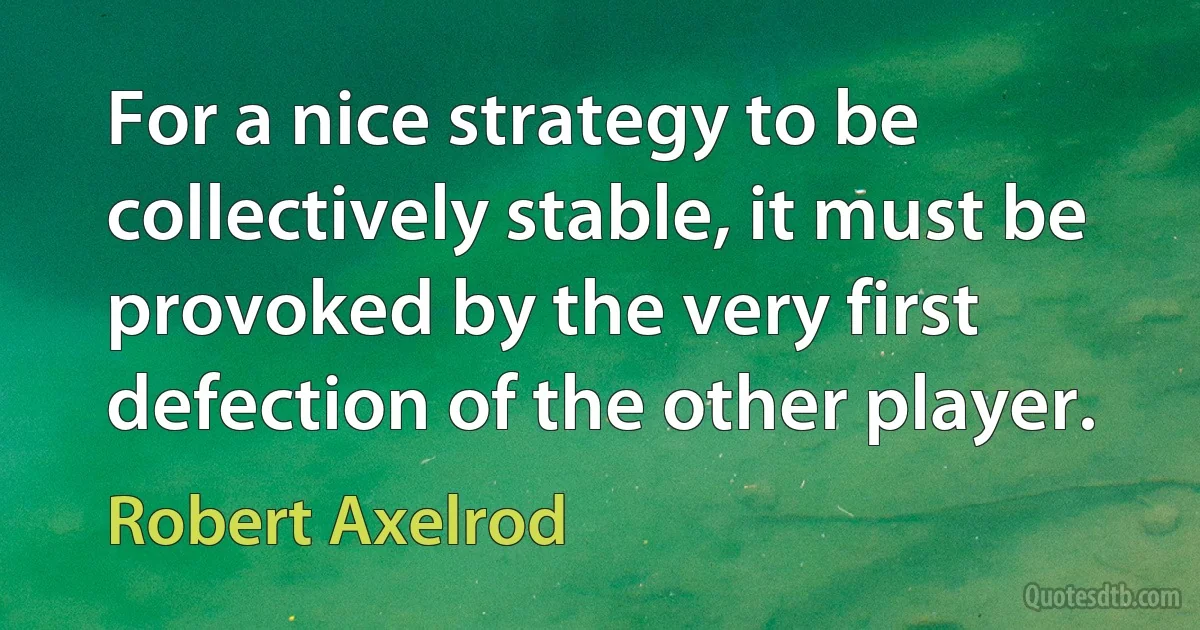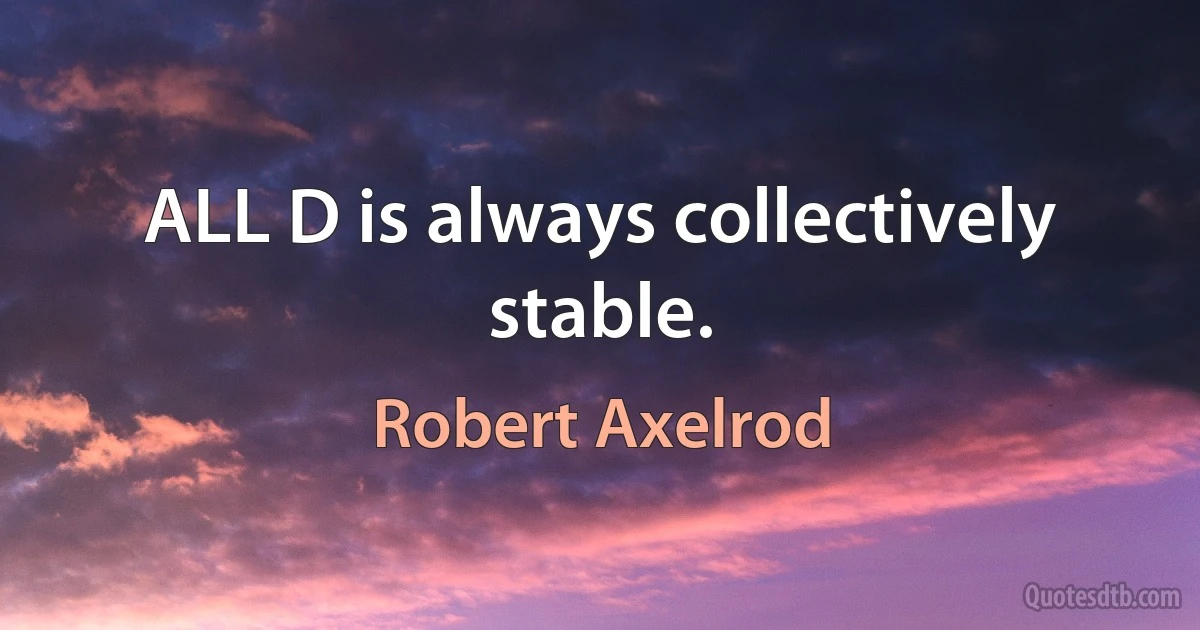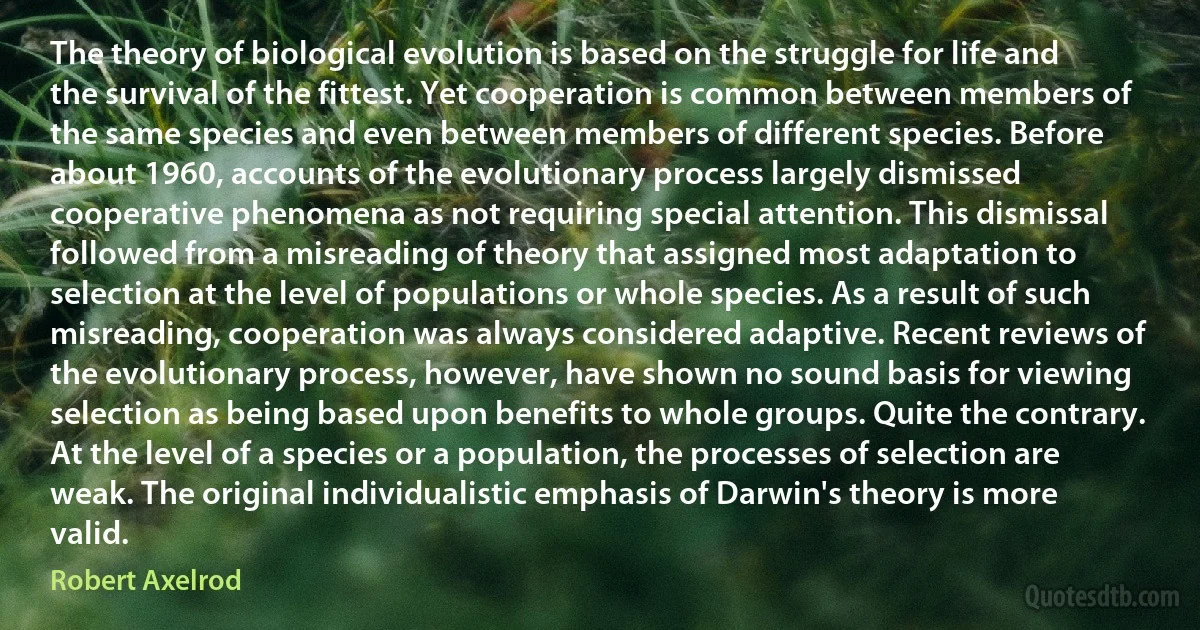Robert Axelrod quotes
Aggregation means the organization of elements of a system into patterns that tend to put highly compatible elements together and less compatible elements apart. Landscape theory predicts how aggregation will lead to alignments among actors (such as nations), whose leaders are myopic in their assessments and incremental in their actions. The predicted configurations are based upon the attempts of actors to minimize their frustration based upon their pairwise propensities to align with some actors and oppose others. These attempts lead to a local minimum in the energy landscape of the entire system. The theory is supported by the results of the alignment of seventeen European nations in the Second World War. The theory has potential for application to coalitions of business firms, political parties in parliaments, social networks, social cleavages in democracies, and organizational structures.

Robert Axelrod
Throughout the social sciences today, the dominant form of modeling is based upon the rational-choice paradigm. Game theory, in particular, is typically based upon the assumption of rational choice. In my view, the reason for the dominance of the rational-choice approach is not that scholars think it is realistic. Nor is game theory used solely because it offers good advice to a decision maker, because its unrealistic assumptions undermine much of its value as a basis for advice.

Robert Axelrod
In fact, in the Prisoner's Dilemma, the strategy that works best depends directly on what strategy the other player is using and, in particular, on whether this strategy leaves room for the development of mutual cooperation. This principle is based on the weight of the next move relative to the current move being sufHciently large to make the future important.

Robert Axelrod
What accounts for TIT FOR TAT's robust success is its combination of being nice, retaliatory, forgiving, and clear. Its niceness prevents it from getting into unnecessary trouble. Its retaliation discourages the other side from persisting whenever defection is tried. Its forgiveness helps restore mutual cooperation. And its clarity makes it intelligible to the other player, thereby eliciting long-term cooperation.

Robert Axelrod
So in a non-zero-sum world you do not have to do better than the other player to do well for yourself. This is especially true when you are interacting with many different players. Letting each of them do the same or a little better than you is fine, as long as you tend to do well yourself. There is no point in being envious of the success of the other player, since in an iterated Prisoner's Dilemma of long duration the other's success is virtually a prerequisite of your doing well for yourself.

Robert Axelrod
The tournament results show that in a Prisoner's Dilemma situation it is easy to be too clever. The very sophisticated rules did not do better than the simple ones. In fact, the so-called maximizing rules often did poorly because they got into a rut of mutual defection. A common problem with these rules is that they used complex methods of making inferences about the other player-and these inferences were wrong. Part of the problem was that a trial defection by the other player was often taken to imply that the other player could not be enticed into cooperation. But the heart of the problem was that these maximizing rules did not take into account that their own behavior would lead the other player to change.

Robert Axelrod
2. Change the payoffs
A common reaction of someone caught in a Prisoner's Dilemma is that "there ought to be a law against this sort of thing." In fact, getting out of Prisoner's Dilemmas is one of the primary functions of government: to make sure that when individuals do not have private incentives to cooperate, they will be required to do the socially useful thing anyway. Laws are passed to cause people to pay their taxes, not to steal, and to honor contracts with strangers. Each of these activities could be regarded as a giant Prisoner's Dilemma game with many players.

Robert Axelrod
5. Improve recognition abilities The ability to recognize the other player from past interactions, and to remember the relevant features of those interactions, is necessary to sustain cooperation. Without these abilities, a player could not use any form of reciprocity and hence could not encourage the other to cooperate.

Robert Axelrod
A major goal of investigating how cooperative norms in societal settings have been established is a better understanding of how to promote cooperative norms in international settings. This is not as utopian as it might seem because international norms against slavery and colonialism are already strong, while international norms are partly effective against racial discrimination, chemical warfare, and the proliferation of nuclear weapons. Because norms sometimes become established surprisingly quickly, there may be some useful cooperative norms that could be hurried along with relatively modest interventions.

Robert Axelrod
The social influence model illustrates three fundamental points:
1. Local convergence can lead to global polarization.
2. The interplay between different features of culture can shape the process of social influence.
3. Even simple mechanisms of change can give counterintuitive results, as shown by the present model, in which large territories generate surprisingly little polarization.

Robert Axelrod



